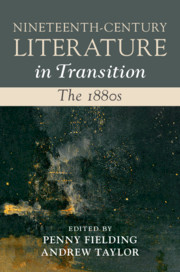Book contents
- Nineteenth-Century Literature in Transition: The 1880s
- Nineteenth-Century Literature in Transition
- Nineteenth-Century Literature in Transition: The 1880s
- Copyright page
- Contents
- Figures
- Contributors
- Acknowledgments
- Introduction: ‘Knowledge Made for Cutting’
- Chapter 1 Mermaids Amongst the Cables: The Abstracted Body and the Telegraphic Touch in the Nineteenth Century
- Chapter 2 Enclosing Forms, Opening Spaces: The 1880s Fixed-Verse Revival
- Chapter 3 ‘The Newest Culte’: Victorian Poetry and the Literary Societies of the 1880s
- Chapter 4 The Time of W.E. Henley: ‘Minor Poetry’ and the 1880s
- Chapter 5 The Evolution of Point of View
- Chapter 6 Network, History, Method: Andrew Lang in and after the 1880s
- Chapter 7 Animated Conversations: Form, Transformation and the Category of the Novel in the 1880s
- Chapter 8 Henry James, Vulgarity and Transatlantic Moderation
- Chapter 9 He and She: The 1880s, Camp Aesthetics and the Literary Magazine
- Chapter 10 Men, Women and Horses: Public Spectacle in 1887
- Chapter 11 The Secular Turn in British Literature of the 1880s
- Index
Chapter 6 - Network, History, Method: Andrew Lang in and after the 1880s
Published online by Cambridge University Press: 10 October 2019
- Nineteenth-Century Literature in Transition: The 1880s
- Nineteenth-Century Literature in Transition
- Nineteenth-Century Literature in Transition: The 1880s
- Copyright page
- Contents
- Figures
- Contributors
- Acknowledgments
- Introduction: ‘Knowledge Made for Cutting’
- Chapter 1 Mermaids Amongst the Cables: The Abstracted Body and the Telegraphic Touch in the Nineteenth Century
- Chapter 2 Enclosing Forms, Opening Spaces: The 1880s Fixed-Verse Revival
- Chapter 3 ‘The Newest Culte’: Victorian Poetry and the Literary Societies of the 1880s
- Chapter 4 The Time of W.E. Henley: ‘Minor Poetry’ and the 1880s
- Chapter 5 The Evolution of Point of View
- Chapter 6 Network, History, Method: Andrew Lang in and after the 1880s
- Chapter 7 Animated Conversations: Form, Transformation and the Category of the Novel in the 1880s
- Chapter 8 Henry James, Vulgarity and Transatlantic Moderation
- Chapter 9 He and She: The 1880s, Camp Aesthetics and the Literary Magazine
- Chapter 10 Men, Women and Horses: Public Spectacle in 1887
- Chapter 11 The Secular Turn in British Literature of the 1880s
- Index
Summary
This essay uses the case of Andrew Lang to assess the critical trope of the network and assess its value for contemporary historicist method. After introducing Lang’s dizzyingly productive career as media impresario, author, popularizer, and translator, it surveys the network sociologies of Pierre Bourdieu and Bruno Latour and evaluates, against these, Lang’s own networking practice. This relationship-making or mediating work is evident in Lang’s translations of Homer, his collaboratively authored novels, his popularizing sensibility, and his promiscuous approach to intellectual property. It is materialized, too, in the complicated authorial dynamics that gave rise to his Fairy Book projects. Borrowed, adapted, repackaged, and multiply mediated, these hybrid works show how attending to assemblages rather than individuals, relationships rather than instances, and edges rather than nodes, might expand conventional models of creative agency in literary studies and enable new configurations of literary-historical time. Specifically, Lang’s work on the nonlinear temporality of anthropological ‘survivals’ suggests that renewed attention to collaborative, networked causality will call into question the autonomous standing of period-concepts as such - including the decade.
Keywords
- Type
- Chapter
- Information
- Nineteenth-Century Literature in Transition: The 1880s , pp. 117 - 138Publisher: Cambridge University PressPrint publication year: 2019



